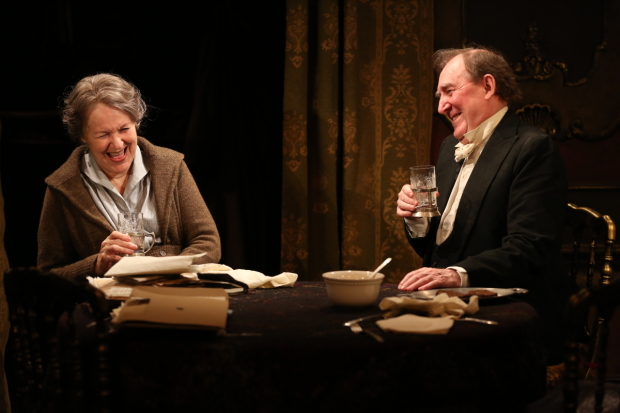Afterplay

(© Carol Rosegg)
Ireland and Russia may be separated by the entire European landmass, but as Tony-winning playwright Brian Friel (often called the "Irish Chekhov") casually reminds us in his hybrid plays, citizens of both lands share a yen for poetic chats over a few rounds of anything likely to induce premature cirrhosis. As we approach the one-year anniversary of Friel's death, Irish Repertory Theatre commemorates his celebrated body of work with his slender but heartbreaking Chekhovian homage, Afterplay.
Published in 2002 as part of a trilogy of one-acts — collectively titled Three Plays After — Afterplay plucks Sonya from Uncle Vanya and Andrey from Three Sisters (played by kinetic scene partners Dearbhla Molloy and Dermot Crowley) and sits them down at a café in 1920s Moscow over a bottle of vodka and a bowl of cabbage soup. Surrounded by the dark reds and elegant gold trim of a traditional Russian tea room (designed by John Lee Beatty), Sonya shuffles through stacks of papers trying to organize the affairs of her estate, left in her command after the death of her Uncle Vanya. A timidly cheerful Andrey then wanders in — fiddle tucked under his arm and donning concert formalwear (a suitably bedraggled ensemble designed by Fabio Toblini) — and approaches Sonya for round two of a conversation he tells us began last evening.
The first half of the hourlong scene is largely relegated to the trading of back stories for the benefit of both Friel's characters and audience members who may not be proficient in the Chekhov oeuvre. Looking back over 20 years, Sonya recounts the tortured love triangle that unfolded between the beautiful Yelena and her two suitors, Vanya and Doctor Astrov (for whom Sonya herself has carried a torch for decades). Andrey in turn discusses his sisters (only two of whom are still living), his two children, and his heartless wife, Natasha, whose long-ago affair with Protopopov has clearly left residual scars.
The Irish levity of Friel's dialogue, directed with palpable heart by Joe Dowling, makes for an enjoyable back-and-forth between traditionally dour Russian characters. But the piece doesn't truly capture our imaginations until this carefully laid groundwork of exposition reveals an organic bridge between the two protagonists. As characters who are left relatively hopeless at the conclusion of their original narratives, Sonya and Andrey make an ingenious pairing for Friel's joint epilogue.
Sonya, Chekhov's perpetual Plain Jane tormented by unrequited love, is played by Molloy with a warm poise, guarded (maybe even paralyzed) by years of disappointment. She's a pitiable woman, and yet a perfect fit for the cuckolded Andrey, who Crowley depicts as the sweetest nebbish you'll ever want to root for. The solution to each of their lonely lives could very well be sitting just across the table — but of course in the world of tragic drama, complex emotions and inner demons make everything infinitely more complicated.
True to the source material, happily ever after is likely just out of reach for Friel's imaginings of Chekhov's tragic supporting characters. But even if the story of Sonya and Andrey is not resolved in the way we'd like, we appreciate the chance to greet them again — and can perhaps hope they'll find each other again at another café.











